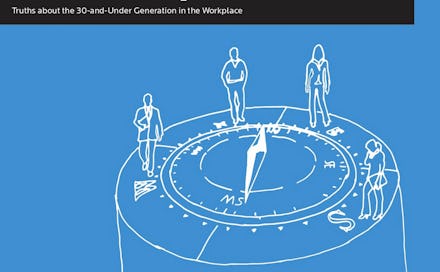6 New Findings Reveal How to Better Manage Gen Y Hires

The recession has definitely affected the way young people view work. And as a result, Gen Y tends to be independent, optimistic, diverse and not trusting.
This may put them at odds with older workers who don't understand what their young colleagues want in today's transformational workplace. Sometimes this causes unnecessary tension. Other times, it leads to an unproductive work environment with high turnover.
To examine young people's attitudes and expectations in the workplace, global PR firm MSLGROUP teamed up with researchers at Ashridge Business School in the UK and found some interesting results.
"They may lack some of their predecessors' relationship, communication and analysis skills, but they're confident in their abilities to run business in a new way," the researchers said.
The study, which included 1,293 millennial employees from the U.S., Brazil, China, France, India and the U.K., also measured whether young people from different parts of the world think the same way. For example, does a 25-year-old from Beijing have the same expectations as their counterpart in London or New York?
Here are the six takeaways from The Millennial Compass study, presented at SXSW on Monday by Mashable's Peter Cashmore and Olivier Fleurot, CEO of MSLGROUP and a French baby boomer.
1. Young people are super ambitious.
Blame it on technology. Young people know what their skills are worth to employers and they're not planning on being passed over for promotions.
According to the study, more than 40% of young people want to be in a management position within two years of graduating.
Young people from India are the most ambitious with 37% expecting to be in a management role within one year of graduating from college and 25% expect to be in a senior management position or running their own companies within two years of graduation.
The most relaxed young people live in France with 43% of these respondents expecting to be managers by three years.
What should employers do? "Companies should clearly communicate steps and requirements for career advancement. They should provide career development planning to help Millennials move along their career paths at a pace appropriate for them and the organization."
2. Young people are very entrepreneurial-minded.
Young people grew up during the entrepreneurial-age and desperately feel the need to do their own thing. In other words, they don't want to be tied to an organization.
According to the study, 30% of those surveyed said they would leave their organizations within the next year and 50% plan on leaving after two years (the average time a Gen Y worker stays with an organization).
The most entrepreneurial-minded millennials are in the U.K. and Brazil — followed by France, India and the U.S.
What should employers do? "Organizations must have robust human resources strategies to retain key personnel, develop bench strength and recruit new talent, especially in business-critical areas."
"All companies should have a strong employee brand and ongoing employee engagement programs highlighting benefits important to Millennials."
3. Young people want a manager who is a friend or a peer.
Young people in the U.S., U.K. and Brazil view thier managers as a friend who respects and trusts them. In France, Gen Y views managers as peers and the relationship is more stringent.
In the chart above, the left column represents how young people see their relationships with their bosses and the right column represents what managers think their relationship should be with subordinates
What should employers do: "Managers should strive to understand what motivates Millennial team members — not to accommodate them, but to strengthen relationships and drive better results. Since every employee-boss relationship is different, this should be done in one-on-one conversations and performance reviews."
4. They don't want a hierarchical relationship with their boss.
Young people want to be in a work environment where they can be supported and offered regular feedback.
A strategic way to provide feedback in a constructive way is to respect the person you're speaking to, or, in other words, not adopt a top-down mentality.
What should employers do: "Younger managers may have to assume more of a coach or mentor role to establish authority and balance the 'friend' dynamic."
5. Young people care about knowledge — not titles.
Millennials from all countries included in the study said they want a knowleadgeable manager. Young people are not concerned with titles and "strongly admire those with experience, at any level, over position or power."
What should employers do: Young people "want managers and senior colleagues to be experts willing to share their knowledge with younger employees."
6. Young people are motivated by other young people.
Young people in India and China believe that their employers harness their talents. Interestingly, these countries also have the highest percentage of young managers.
"In China, 78% of managers are Late Gen X (31-40 years old) or Millennials (under 30), and this figure is 75% for India. Conversely, France’s managers are 47% Early Gen X (41-50 years old) or Baby Boomers (over 50). Millennials in France had the lowest score (42%) when asked if they believe their organization harnesses their talents."
What should employers do: "Companies must recognize the potential disconnect between older managers and younger employees, and help each party appreciate the other's value. This can be accomplished through communication training, engagement programs and mentoring programs designed to bridge the generational divide."